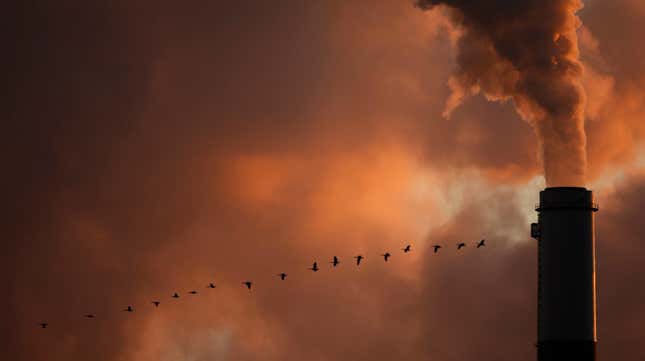
Twenty experts who formerly served on the Environmental Protection Agency’s Clean Air Scientific Advisory Committee (CASC)—and who were canned as part of the Donald Trump administration’s plan to stock its panels with industry shills—met this week to continue their work independently, NBC News reported.
The EPA is required to review particulate pollution standards every five years under the Clean Air Act, though it sometimes comes in behind schedule to incorporate scientific advice. The 20 scientists, engineers, and researchers said that the EPA’s decision to strip the CASC down to seven core members has left it without the scientific expertise necessary to perform their mission; on Thursday and Friday in Washington, D.C., this week, they met to continue their work as the Independent Particulate Matter Review Panel. They told NBC News they are skeptical that Trump’s EPA has any interest in taking science seriously (and, in fact, is trying to disregard it as part of its deregulatory push).
“It’s pretty clear in the context of this EPA there’s a strong agenda to roll back regulations, and the science does not always lead to a conclusion that a rollback is the right thing to do,” former CASC chair and current independent panel chair Christopher Frey told NBC. “Rather than listen to the science and making an appropriate decision, science is being sidelined.”
“They’re providing advice like we did in the past,” former EPA Air Office associate director for science and policy John Bachman told the network. “Not all of these folks are going to agree with each other or the EPA, but this is something the EPA should really want to continue.”
EPA inspections have fallen to their lowest in a decade under the Trump administration, the Washington Post reported earlier this year, with agency inspectors visiting 10,600 industrial facilities—less than half what it did in 2010. The number of civil cases the agency began and completed in 2018 was also the lowest in a decade, and the $69 million in penalties dealt out by the EPA was the lowest “in nearly a quarter-century,” the Post wrote. While the agency had faced budget cuts in recent years the downward trend was accelerated under the Trump administration’s push for it to work alongside industry. (The EPA told NBC in a statement that enforcement numbers have fallen because it is “leveraging the efforts of the private sector by encouraging self-audits and self-disclosure.”)
Earlier this month, New York Universit’s Brennan Center for Justice released a 72-page report stating that the federal government’s war on science had reached a “crisis point,” slamming the politicization of science under the Trump administration and its failure to appoint senior science officials. Specific issues noted by the report included Trump’s demand that the National Oceanic and Atmospheric Administration cater weather reports to his whims, the Department of Agriculture’s abrupt cross-country relocation and ensuing disruption, suppression of climate research at the Interior Department, and interference with the EPA’s scientific mission.
The Trump administration has also targeted expert advisory boards that advise agencies on scientific and technical issues. NOAA and the Interior Department recently took the ax to protected marine life and invasive species boards respectively under an executive order mandating that federal agencies get rid of a third of their advisory boards.
“EPA has the utmost confidence in its career scientist and the members on its science advisory boards and panels,” an EPA spokesperson told NBC. “EPA routinely takes comments from the public and outside organizations, including those not employed or associated with EPA, and will continue to take into consideration those comments that meet our scientific standards.”
The Independent Particulate Matter Review Panel said it will release its own review of the EPA’s pollution control efforts by Oct. 21, according to NBC.
“There are other efforts like this where people outside of the government are picking up the slack,” Union of Concerned Scientists Center for Science and Democracy research director Gretchen Goldman told the network. “There are opportunities to do that. But it’s ultimately not our job, and we can’t expect outside actors to pick up the slack. This is important work, but it’s not a sustainable model.”